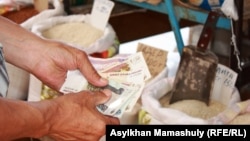As suited traders stare at their screens on global foreign currency markets, migrant workers from Central Asia are paying just as much attention in cities across Russia.
With the US dollar tanking in value amid global market turmoil since the Trump administration unveiled a massive tariffs package, the Russian ruble has risen sharply.
This means migrants in Russia are suddenly sending home much more money.
"People wait months before sending money, hoping that the exchange rate will rise. As soon as it does, they run to the bank or send money on an app. Their moment has come," said 60-year-old Tajik worker Ali, who works in Novosibirsk.
Like other migrant workers interviewed for this article, his full name is being withheld for security reasons. RFE/RL is effectively banned in Russia and speaking with it is a criminal offense.
"It's beneficial for us when the ruble rises. It affects whether your family can get through the month, buy food, or pay for medicine," Ali said.
According to the World Bank, remittances make up 45 percent of Tajikistan's gross domestic product (GDP). In Kyrgyzstan it is 24 percent and in Uzbekistan 14 percent. Most of those funds flow from Russia.
'We Could Not Pay The Mortgage'
Daler, also from Tajikistan, works in Moscow. He sends home around 10,000 rubles every month. That is 123 dollars, based on market rates on April 23 . Back in January, it was worth around 90 dollars.
"My wife used to say, ‘the money has come, it will barely last two weeks.' Now, she's even able to save a little."
Daler's family is using the money to build a new home. "It would buy a sack of cement, now I can buy two. Everything is more accessible: both building materials and food."
Anara, a Kyrgyz taxi driver, has been working in Russia for several years.
"We found (extra) part-time jobs, sleeping four hours a night. Without a part-time job, we could not pay the mortgage and feed our family," she said.
"Now we have more than enough money."
Nigora, 47, has four children and an elderly mother back home in Tajikistan. By day she washes dishes in a cafe, by night she works as a cleaner.
Every morning, she and her colleagues discuss the latest events -- and how they may influence exchange rates.
"When [US special envoy Steve] Witkoff came to Moscow, the exchange rate went up. And when Trump spoke about Russia not meeting its obligations, the ruble suddenly fell a bit," she said.
This volatility is a reminder that the ruble's current strength may not last long.
A recent Reuters survey of economists predicted that it would be at around 100 to the dollar, compared to its rate of 82.9 in Moscow afternoon trading on April 23.
Russia's Migrant Crackdown
Alisher Ilkhamov, head of Central Asia Due Diligence, a London-based think tank, pointed to high interest rates in Russia, improved relations with Washington, and the general weakness of the dollar as reasons for the ruble's surge.
"In the coming months the rate of the ruble will depend largely on oil prices and the performance of the dollar," he said.
Anecdotal evidence suggests that the current strength of the ruble has led to an increase in people coming to Russia to seek work.
According to the Russian Interior Ministry, at the end of 2024 there were 6.3 million foreign nationals in the country. The vast majority come from three countries: Uzbekistan (23.3 percent), Tajikistan (16.7 percent), and Kyrgyzstan (10.4 percent).
But coming to Russia is not without risks, ranging from casual racism to full on police brutality.
War And Terrorism
There is also the danger of being forced into military service and sent to Ukraine.
"These days, heading to Russia to earn money is also a journey into the unknown. The increased rate of the ruble creates a stimulus for migration, but increased pressure from the authorities and the risk of ending up at the front in Ukraine make it nerve-wracking and unpredictable," said Ilkhamov.
There has also been a marked increase in deportations, with official figures showing a record 190,000 people kicked out of Russia last year. This was a 31 percent increase on the previous year.
Since the Crocus City Hall terror attack in Moscow in March 2024, migrants have been met with increased harassment.
"Migrants from Central Asia are increasingly seen in Russia as a security threat," said Nodira Abdulloyeva, a Netherlands-based human rights lawyer.
"It leads to harsher laws, entrance restrictions, mass checks…a general climate of fear."
Central Asian nations are seeking alternative destinations for their migrant workers, but language -- Russian is spoken by the vast majority of people in the region -- plays a big role in attracting them to Russia.
So for now, they'll keep following the course of the ruble.















